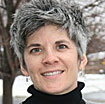Commentary on Jeremiah 23:23-29
The scathing scolding present in Jeremiah 23 suggests that false prophets had become an insidious problem.
The rebuke is palpable even for those of us who hear these words over two-and-a-half millennia later. Curiously, just when Jeremiah’s poetic rant is in high gear, there is a change in tone as well as form. This pivotal point is where the pericope begins (verse 23). The form changes from poetry to prose while the content seems to reflect an intentional distancing from the previous harangue in order to focus on the character of God. There is a series of rhetorical questions which get at the heart of who God is. Of course, it is Jeremiah who is speaking, but he is presenting himself as a true prophet through whom God is speaking. Jeremiah’s hope is that he will be seen as a true prophet distinguished from the false prophets. Even more, the hope is that God is seen as the one true God distinguished from the false gods.
While an interesting angle of this text is to delineate false from true prophets, it is especially intriguing to discern what this text says about the character of God. While every biblical text deserves this inquiry, it is especially valuable with a text that highlights God’s identity and role in the midst of human unfaithfulness. Exploring this text theologically reveals a God who 1) laments, 2) is pervasive yet near, and 3) speaks powerful words.
“How Long?” (verse 26) is lament language. God is concerned about the ever-widening gap between God and God’s people as a result of people being led astray by false prophets. Stated in another way, God’s desire for a close relationship with God’s people is evident. The trouble is that false prophets are convincing. They even use acceptable means through which God might speak (dreams) in order to manipulate their targets. God is aware of such tactics. God is also aware that, like their ancestors, false prophets attempt to get their would-be followers to forget God’s name (verse 27). It is telling that our lamenting God is concerned not only for those who follow false prophets, but for the false prophets themselves (“Will the hearts of the prophets ever turn back?”).
Secondly, God is pervasively present though not “dangerously” present. God (through Jeremiah) speaks of this both/and. “Am I a God near by and not a God far off?” and “Do I not fill heaven and earth?” A god who is too near cannot possibly be aware of the bigger picture. Even more, a god who is too near could become too confined, too controllable, too “cozy” in one’s “pet” circumstances. False prophets describe such a god. And yet, a god who is too far off has no concern for the local situation of real people. That is certainly not true of God. Otherwise, God would not be speaking to this particular situation. Thus, God is both perfectly near and perfectly pervasive. A true prophet grasps this paradoxical character of God.
Thirdly, Jeremiah 23 reveals a speaking God whose words are powerful. God is so confident in God’s true word that God encourages the false prophets to go on having their say. “Let the prophet who has a dream tell the dream, but let the one who has my word speak my word faithfully.” Recall that earlier (Jeremiah 23:16), it was suggested that the false prophets’ so-called divine dreams come from “their own minds” and not “from the mouth of the Lord.”
In verse 29, the competing words (that is, God’s and those of false prophets) are as distinct as straw and wheat. Whereas the words of false prophets are like chaff, God’s words are like food that nourishes. The obvious answer to the question, “What has straw in common with wheat?” is, “Nothing.” While God’s word nourishes, it is no schmaltzy, accommodating, feel-good word. God’s word is like fire (that is, judgment — see 4:4; 5:14) and like a “hammer that breaks a rock into pieces” (see 50:23; 51:20). Perhaps Jeremiah is reacting to his opponents who have responded negatively to his pronouncements of judgment. Unlike the words of the false prophets which lure with their sugar-coated promises, Jeremiah’s words can sting. (Perhaps this is the connection to this Sunday’s potentially “offensive” Gospel reading.)
This text prompts preachers to respond to a few questions. First, do these characteristics of God match the way you depict God in your preaching? Secondly, how do you, in your preaching, distinguish between false and true prophets? Finally (and this may be the most difficult, yet most important, to answer), how do you avoid the ways of false prophets who speak a word from their own minds and not the mouth of the Lord, in favor of the ways of true prophets whose words point people toward the one, true God?

August 15, 2010